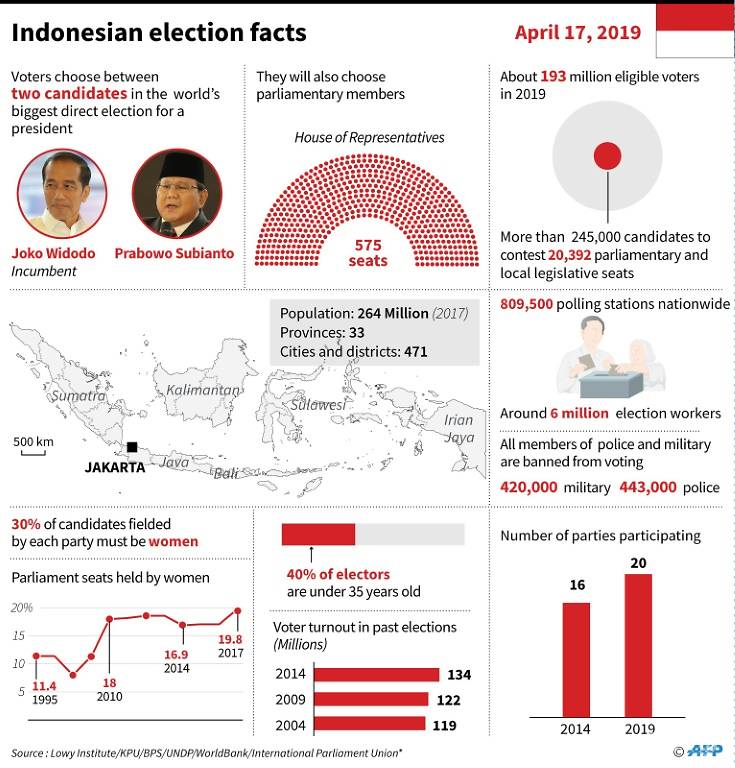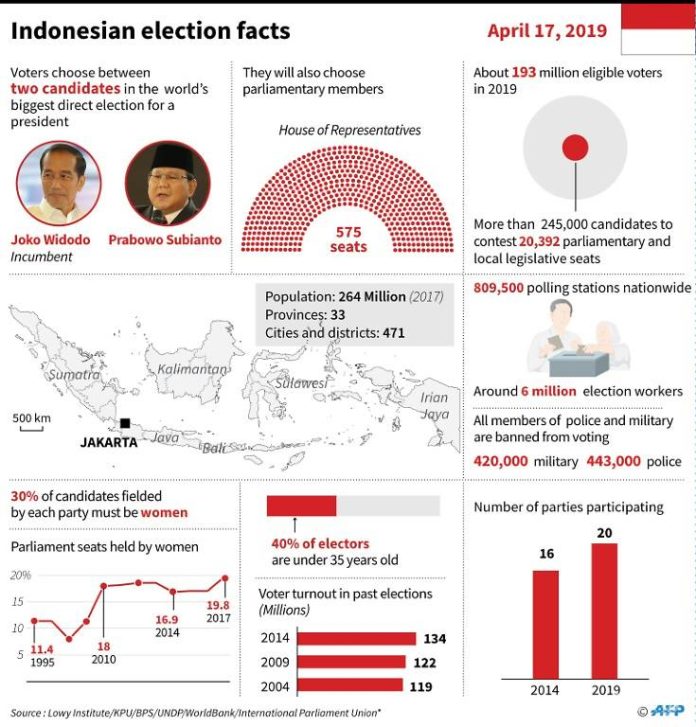JAKARTA: More than 10,000 people have volunteered to crowd-source election results posted at polling stations across Indonesia on Wednesday (Apr 17) in a real-time bid to thwart attempts at fraud during the biggest single-day election in the world.
Nearly 193 million people are eligible to vote for the Southeast Asian country’s president and thousands of legislative seats, a Herculean logistical feat many fear could be exploited by cheats.
Tension over alleged election irregularities is already running high between the camps of the two contenders for the presidency, incumbent Joko Widodo and retired general Prabowo Subianto, with charges of suspicious names on electoral rolls and ballot tampering.
An organisation called Kawal Pemilu, or Guard the Election, has brought together volunteers from across the sprawling archipelago to post on its website photographs of result tabulations that go up at polling stations to ensure they match official vote tallies.
READ: Floods, cyberattacks, voter fraud: Indonesia braces itself for polling challenges
READ: To vote or not to vote, that is the question for many Indonesians ahead of election
READ: Rising food prices a hot button issue in Indonesia presidential race
The crowd-sourced results on KawalPemilu.org will then be tabulated manually by the organisation.
“We aim to be the data back-up plan for the election,” Kawal Pemilu co-founder Elina Ciptadi said. “To ensure transparency and stop fraud.”
She said that more than 10,000 volunteers have been verified and 3,000 to 5,000 more have registered online to join the “election guardians”, who are required to provide their names and Facebook profiles. Another 2,000, many of them Indonesian expatriates, will work as moderators, logging in data.

(Graphic: AFP)
University student and alumni groups have pledged to help, as have the youth wings of prominent religious organisations, including of the Catholic Church, and of the two largest Muslims organisations, Muhammadiyah and Nahdlatul Ulama.
Ciptadi and data scientist Ainun Najib, both Indonesian expats who live in Singapore, started the initiative after the last election in 2014 – also a contest between Widodo and Prabowo – when both campaigns declared victory.
“Both sides claimed to win … but neither of them were revealing the data,” said Ciptadi.
Because the electoral commission (KPU) had posted 2014’s polling station results on its website, the group was able to scrape numbers into a database and crowd-source accurate results in six days, while officials took more than two weeks to calculate almost exactly the same result by hand.
EIGHT-HOUR ELECTION
This time the challenge is even greater.
For the first time Indonesia will be holding presidential and parliamentary polls simultaneously, with more than 245,000 candidates running for legislative seats in an exercise that will involve more than 800,000 polling stations and about 6 million election workers.
While the world’s largest democracy, India, is now spreading its election out over seven phases, Indonesia – with roughly one-fifth of India’s population – will get the job done in just eight hours.
The General Election Commission is expected to announce an official result in May.
Ciptadi stressed that her organisation was strictly neutral.
“We are not a political movement, we are an open-data initiative,” she said.
Most opinion polls give Widodo, a former furniture salesman whose political career began as a small-city mayor, a double-digit lead over Prabowo, whom he narrowly defeated in 2014.
The opposition has disputed survey findings. It has also said it uncovered data irregularities affecting millions on the electoral rolls and vowed to take legal action or use “people power” if its complaints are not resolved.
“We are very worried about the issue because the number is huge, there are 17.5 million problematic names in the voter list,” Hashim Djojohadikusumo, deputy director for the Prabowo campaign, told reporters on Sunday.
He said that suspiciously large numbers had Dec 31 and Jan 1 birth dates, and area codes that did not exist.
A spokesman for the election commission refuted the allegations, telling Reuters they had verified the existence of the 17.5 million voters, as based on civil records.
Several videos appeared online last week apparently showing thousands of voting papers stuffed in bags at a warehouse in neighbouring Malaysia, with many apparently already marked.
One showed people holding up ballots, saying they were marked in favour of Widodo, as well as for a member of one of the political parties backing him.
The election supervisory board met Malaysian police on Monday to discuss the case, media reported.
The supervisory board is also deciding whether to hold a new vote for Indonesians in Sydney, after several hundred registered voters were still standing in line after the polls closed there on Saturday.
A rights group has warned that more than 1 million indigenous people, many of whom live in forest areas or conflict zones, won’t be able to vote because authorities had not registered them.
The Indigenous Peoples Alliance of the Archipelago, which represents 15 million indigenous people, told Reuters that several communities had never been registered for electronic identification cards, which provide the right to vote.
A home affairs ministry spokesperson disputed those findings and said any indigenous person who wanted to vote could register. “Please live in a legal location,” he said.





